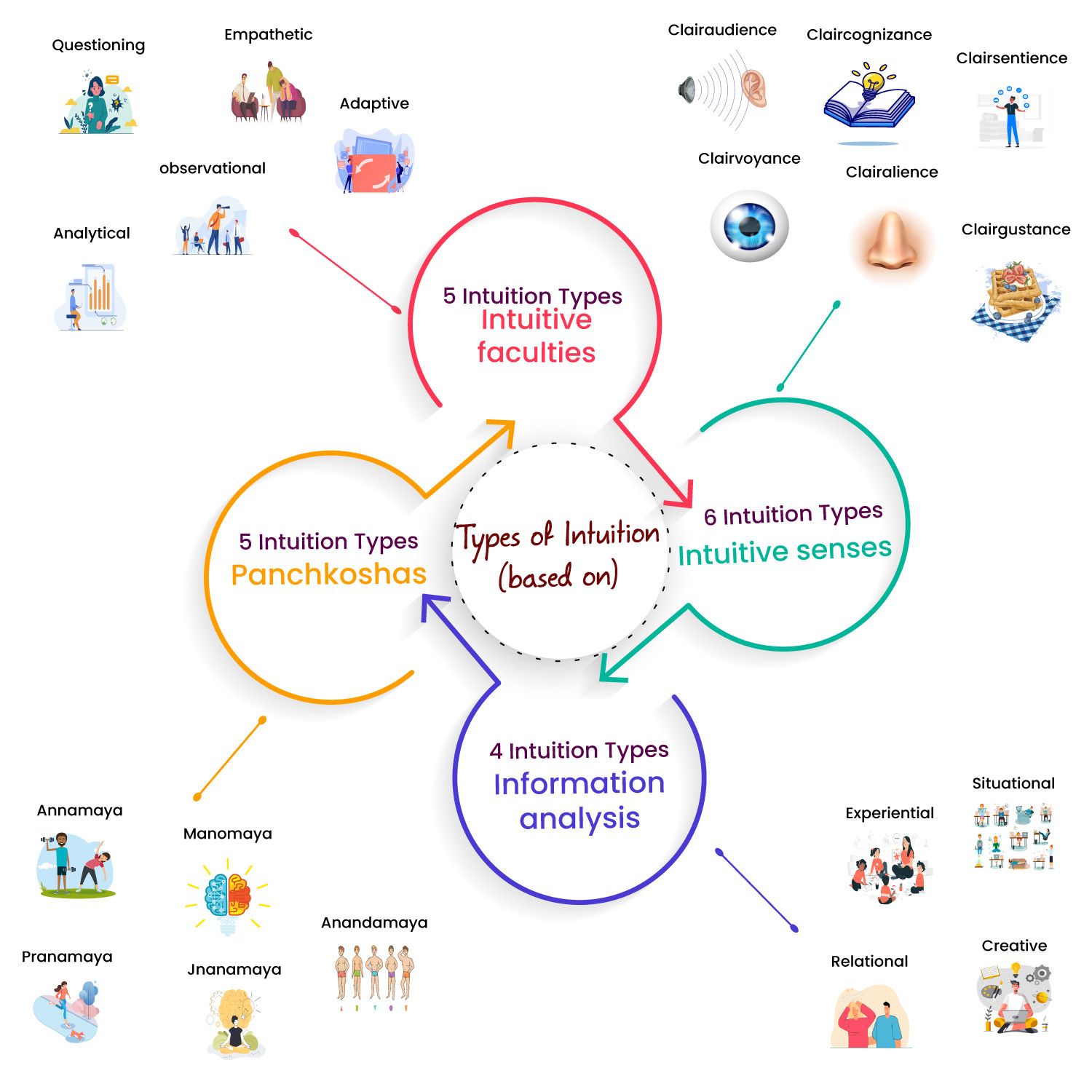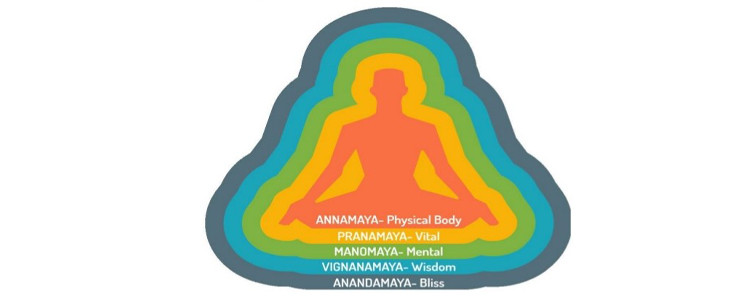Ratan Tata shares his formula for choosing projects for investment, “I found in my case that company selection was more by intuition rather than numbers, and by judging on the intent of the founders and their seriousness, more than any other factor”.
These people dial into their “gut instincts” and are almost never wrong. Their unconscious mind uses past experiences and knowledge to prompt the right decisions. It is nothing but intuition.

Help your children and teens unlock their sixth sense with Prajñā Yoga - Intuition Process. It involves simple exercises and meditation to enhance intuitive abilities in children.
Intuition in psychology
Intuition is a burning issue in psychology today. The researchers suggest that in psychology, intuition refers to the brain process that gives people the decision-making ability without using analytical tools, reasoning, or logic.

What are the four types of intuition as per psychology?
The classification on the basis of information analysis and a series of intuitive signals gives four types of intuition.

Experiential Intuition - As the name suggests, this intuition is based on past experiences (good and bad or formal and informal) and learning.
Situational Intuition - scans the surroundings and sends warning or inviting signals based on the safety of your environment.
Relational Intuition - scans the intentions of the people you are with at any point in time. It ensures that you are interacting with authentic people.
Creative Intuition - collects information from the experiential, relational and situational intuition to finally pass judgment. The IITians opting to drop a hefty salary package in an MNC job for a food venture is due to creative intuition.
Dhirubhai Ambani, Indian business tycoon and founder of Reliance Industries, believed in the concept that "more the supply, more will be the demand'. However, this also meant a heavy investment. In spite of his years of observing and researching the market, his instinct and risk-taking ability is what took him where every businessman dreams to be!
What are the five intuition sources as per panchakoshas?
Intuition can have five sources with respect to the panchkoshas or the five sheaths of human existence.

1. Annamaya kosh - It is limited to sense knowledge, thereby, the crudest form of intuition. Everyone experiences this type of intuition.
2. Pranamaya kosh - Knowledge of the life forces (hear, see, smell, taste, feel). it manifests as subtle sensations.
3 Manomaya kosh - Knowledge of the mind. It comes in the form of meaningful visions.
4. Jnanamaya kosh - Knowledge of the intellect and ego. It involves cognition and discernment.
5. Anandamaya kosh - Knowledge of bliss and ultimate life satisfaction. This intuition transcends body and mind and is derived from the experience of the all-pervading Self.
Practicing Panchakosha Guided Meditation improves intuition from all these five sheaths.
Do you want to know your intuitive type?
Intuition can be classified into five based on the intuitive faculties you use.

Analytical intuition for analysts
Analytical intuition involves a lot of time to research and gather data before decision-making. Analysts dig into their intuitive power to explore every potential scenario. They want to understand the details before passing judgment. They take their time for a thorough analysis and precision in decision-making. You will find that impulsive people will generally not have this type of intuition. An example of this is the lawyers. They follow facts and objectify to solve their clients’ cases.
Observational intuition for observers
Observers gather clues, visually (mostly) about the people and scenarios in their immediate surroundings. If one passes an acquaintance in the market that didn’t respond to their smile, the “observer” might take this to heart. They are experts in noticing visual patterns and subtle differences in their environment. A person with keen intuition based on observation might excel better in outdoor activities. Gardeners, artists, graphic designers, and web developers are good observers.
Questioning intuition for investigators
Intuition based on the interrogation of real-life evidence is questioning intuition. It involves trust in asking or surveying others directly. Investigators with this type of intuition doubt the online statistics and the trending videos before decision-making. They prefer questioning their viewers about what they want to see more often. Investigators, accountants and financial valuers have questioning intuition.
Empathetic intuition for psychologists
People with good listening skills have empathetic intuition. They strive to zero down on the source of the problem. They are not in a hurry to pass their judgments. They encourage and allow their colleagues and clients to vent their feelings. All of these aid them to figure out which decision will benefit them the most. As they are good listeners, they also work well with others. Psychologists, doctors, writers and counselors are excellent at questioning intuition.
Adaptive intuition for amateurs
Most of us have adaptive intuition that relies on gut feelings. One with adaptive intuition helps others to think and react fast in situations requiring quick actions. They are a great help in difficult situations. Usually, they have a gut feeling about almost all things. You change your plans in the nick of time basis your neighbor's gut feeling.
What are the six types of intuition based on the senses?
There are six intuition types based on the intuitive senses. The word ‘Clair’ means clear in French.
Clairaudience (listen) - is the intuitive ability to hear psychic messages. It guides in moments of danger or crisis.
Clairvoyance (see) - intuition aids you to see things in a different way. You can see your future events from tarot readings.
Claircognizance (know) - intuition comes out of the blue. The Indian mathematician, Ramanujan, knew the formulas but not their proofs. He didn’t know how he derived the result. The formulas came to his mind directly.
Clairsentience (feel) - intuition senses others’ energy and feelings. You want to help people out of empathetic feeling.
Clairalience (smell) - intuition has an unidentifiable source of smell related to deceased relatives or past memories. It shows their presence. You can be an excellent florist.
Clairgustance (taste) - intuition reveals a taste that is not physically present. It is said that the taste reminds of a deceased relative or past memories. You may be a natural chef or baker.
Conclusion
How many of the different intuitions are you identified with? By understanding the intuitive signs, you can recognize your intuition type. You don't need to identify with one intuition type. Some simultaneously show signs of two or more intuitive abilities. Or one type may dominate the rest.
The transformation from intellectual knowledge to universal knowledge is intuitive knowledge. As you have seen, it is beyond time and space. Intuition can happen anywhere and anytime.
Based on inputs from Gurudev Sri Sri Ravi Shankar
Written by: Pratibha Sharma
Recommended links to talks by Gurudev Sri Sri Ravi Shankar
Reference link
Research on the types of intuition: Inferential and holistic
FAQs
Meditate, nature walk and practice a form of art.
You get the right thought at the right time and it ultimately brings positive results.




















